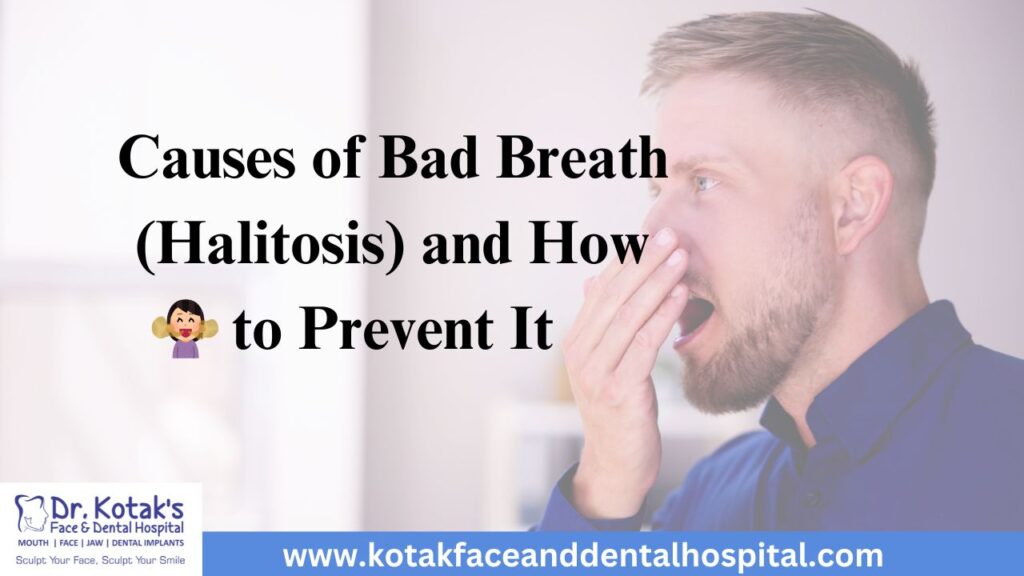
Causes of Bad Breath (Halitosis) and How to Prevent It
Bad breath, medically known as halitosis, is a common yet embarrassing problem that affects millions of people worldwide. It can result from poor oral hygiene, underlying health conditions, or even dietary choices. At Dr. Kotak’s Face and Dental Hospital, we believe in educating our patients about oral health to help them maintain fresh breath and a confident smile.
Common Causes of Bad Breath
1. Poor Oral Hygiene
When you don’t brush and floss regularly, food particles remain in your mouth, promoting bacterial growth on your tongue, gums, and between teeth. This bacterial activity leads to unpleasant odors.
2. Dry Mouth (Xerostomia)
Saliva helps cleanse the mouth by washing away food particles and bacteria. A lack of saliva due to dehydration, medications, or certain health conditions can cause bad breath.
3. Foods and Beverages
Certain foods, such as onions, garlic, coffee, and alcohol, contribute to foul-smelling breath. These substances are absorbed into the bloodstream and exhaled through the lungs.
4. Tobacco Products
Smoking and chewing tobacco not only stain teeth but also cause persistent bad breath. These habits reduce saliva production and increase the risk of gum disease, another source of halitosis.
5. Gum Disease
Gum infections and periodontal diseases create deep pockets in the gums where bacteria thrive, producing a foul odor. Regular dental check-ups can help diagnose and treat gum issues before they lead to chronic bad breath.
6. Sinus and Respiratory Infections
Sinus infections, bronchitis, and other respiratory conditions can lead to postnasal drip, which allows bacteria to feed on mucus, causing bad breath.
7. Gastrointestinal Issues
Acid reflux, ulcers, and other digestive problems can contribute to halitosis by allowing stomach acids and undigested food to rise up into the esophagus and mouth.
8. Medical Conditions
Certain health conditions, such as diabetes, kidney disease, and liver disorders, can cause distinct bad breath odors due to metabolic changes in the body.
How to Prevent and Treat Bad Breath
- Maintain Good Oral Hygiene – Brush twice a day with fluoride toothpaste, floss daily, and clean your tongue to remove bacteria buildup.
- Stay Hydrated – Drink plenty of water throughout the day to keep saliva production at optimal levels.
- Watch Your Diet – Avoid excessive consumption of odorous foods and beverages.
- Quit Smoking – Eliminating tobacco use can significantly improve your breath and overall oral health.
- Chew Sugar-Free Gum – This stimulates saliva production and helps wash away food particles.
- Visit Your Dentist Regularly – Schedule professional cleanings and dental check-ups to detect and treat oral health issues early.
- Manage Underlying Health Conditions – If bad breath persists despite good oral hygiene, consult a doctor to rule out medical causes.
Final Thoughts
Bad breath can be embarrassing, but it is preventable and treatable with proper oral care and lifestyle changes. If you’re struggling with persistent bad breath, visit Dr. Kotak’s Face and Dental Hospital for a comprehensive dental evaluation and personalized treatment plan.
For appointments, contact us today and take the first step toward fresher breath and a healthier smile!


